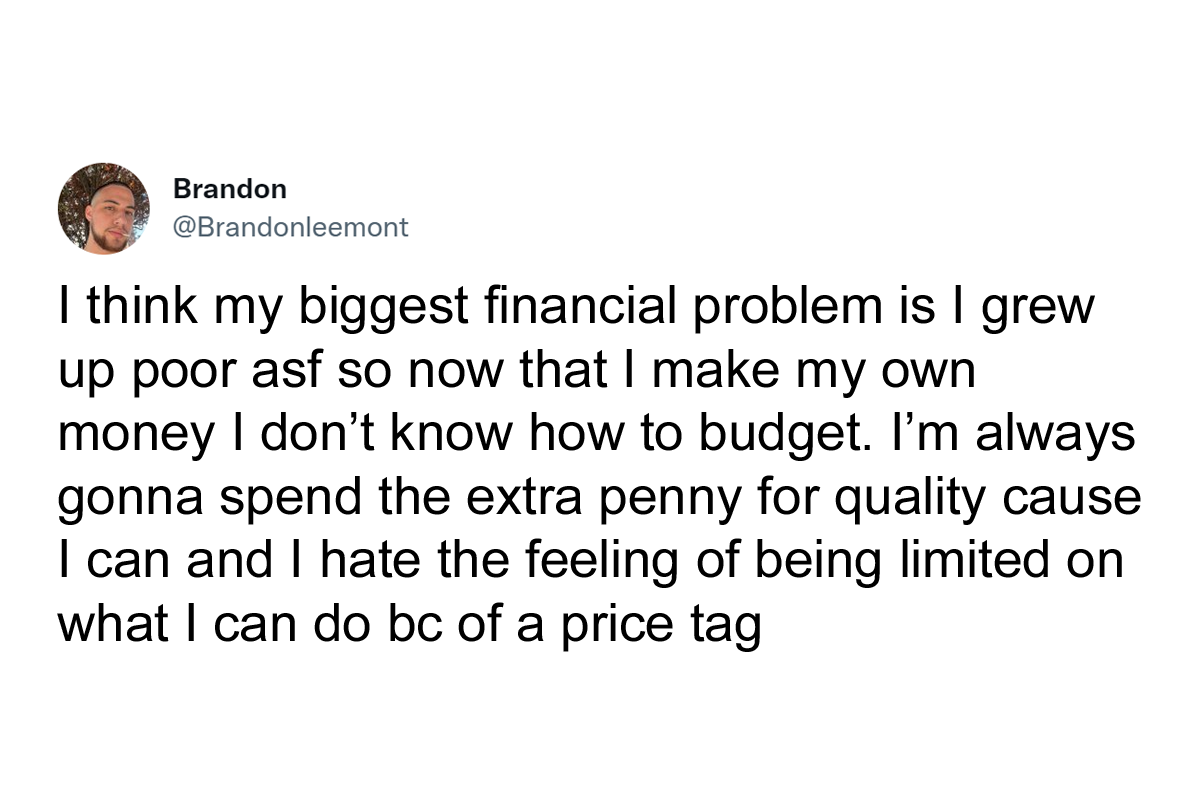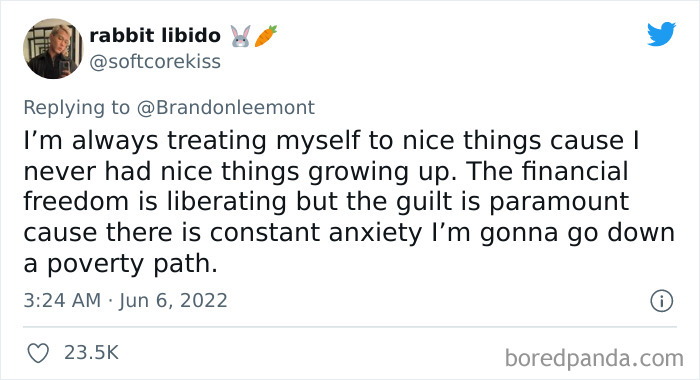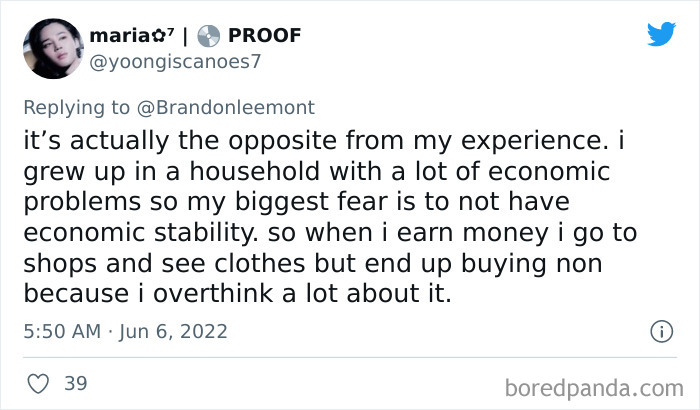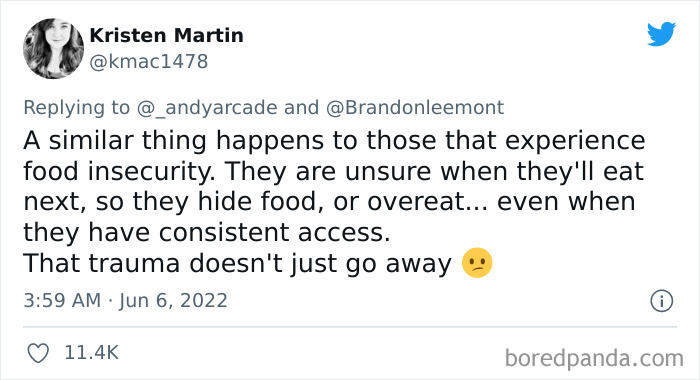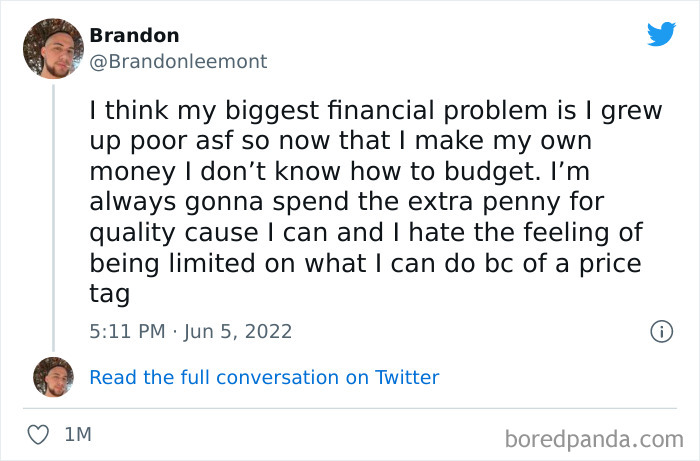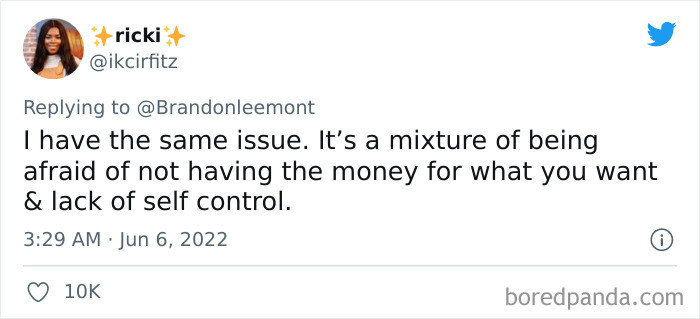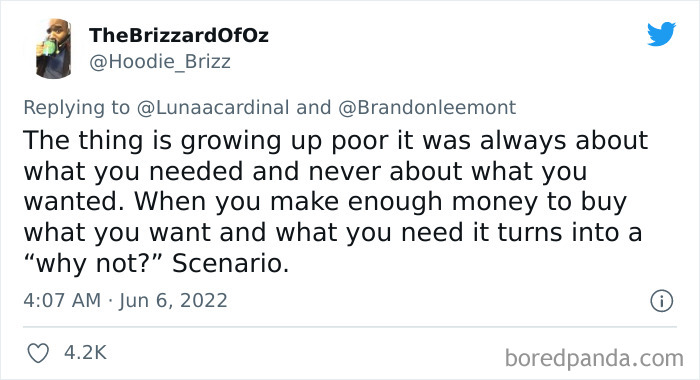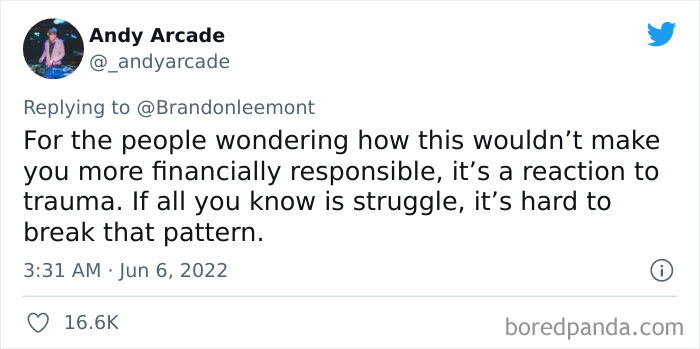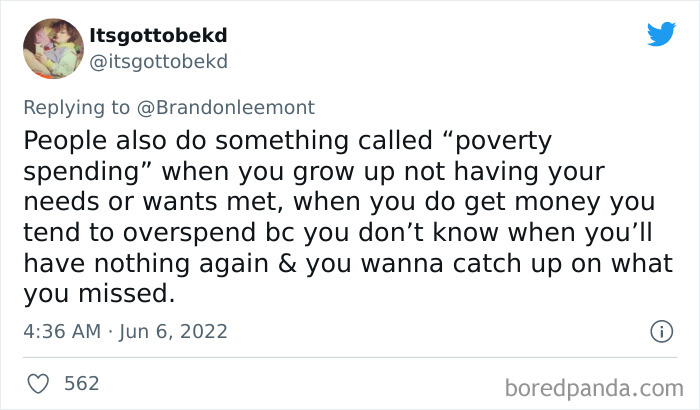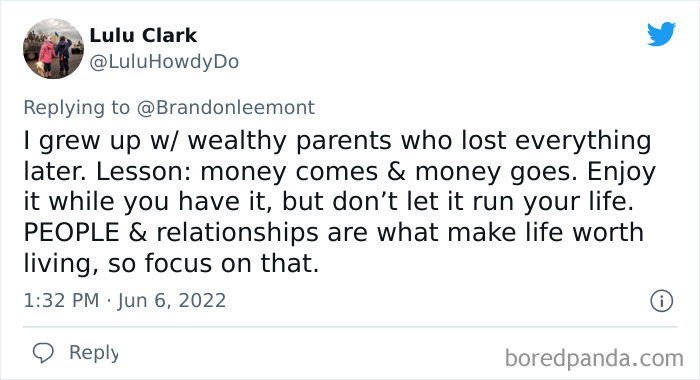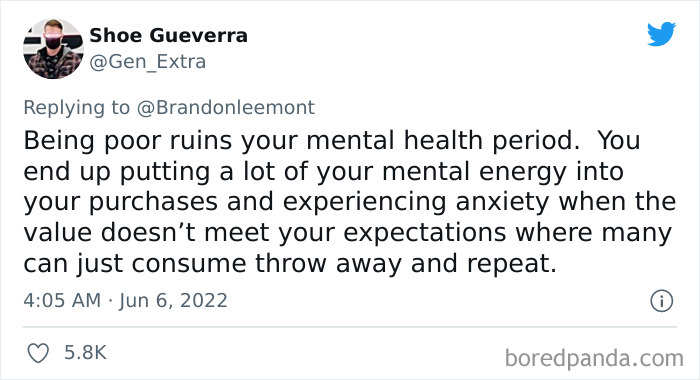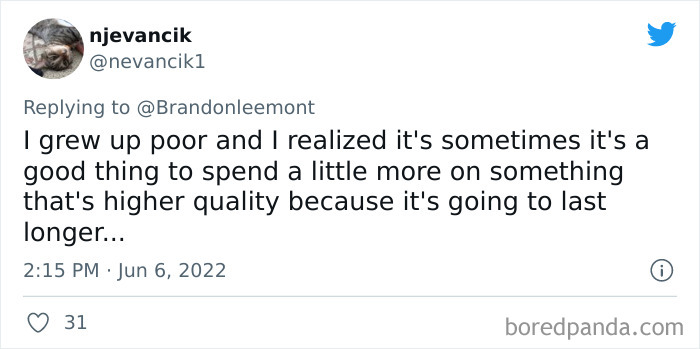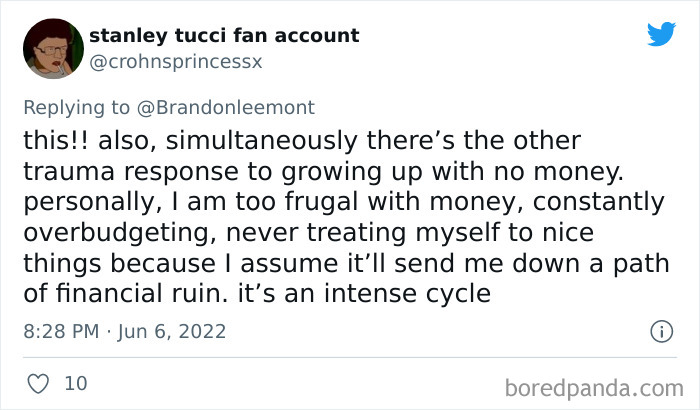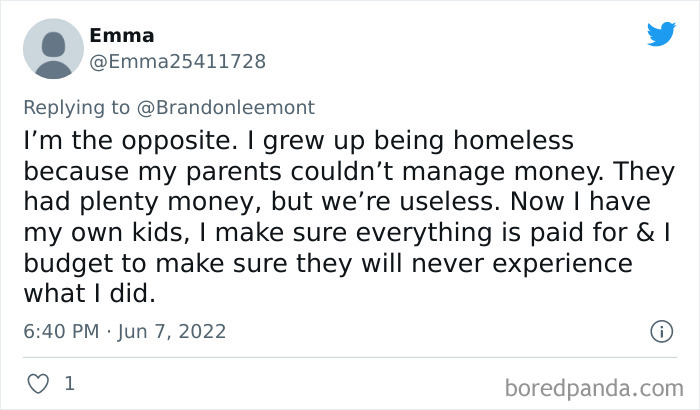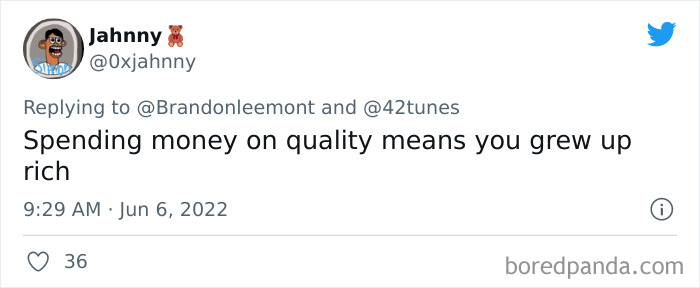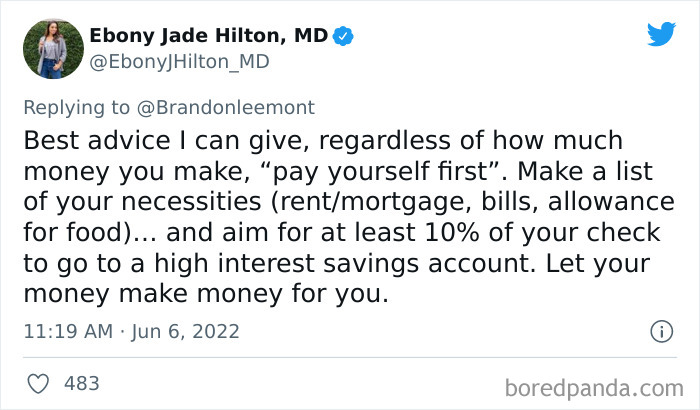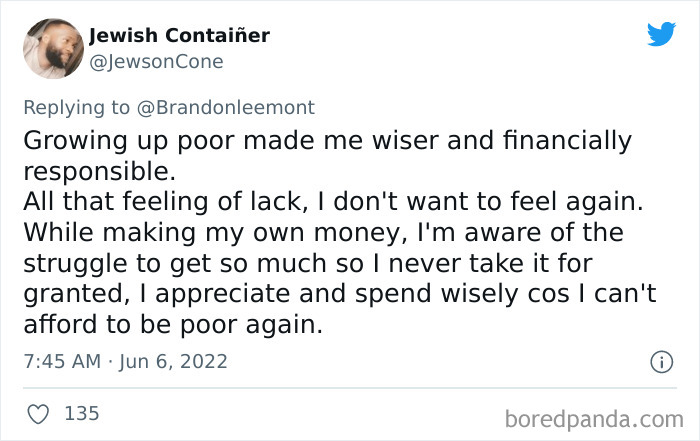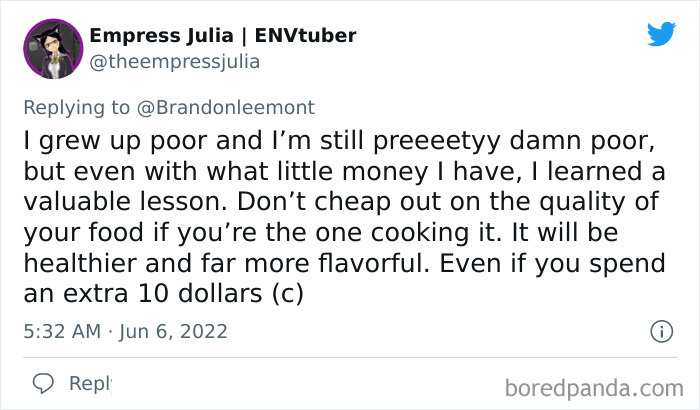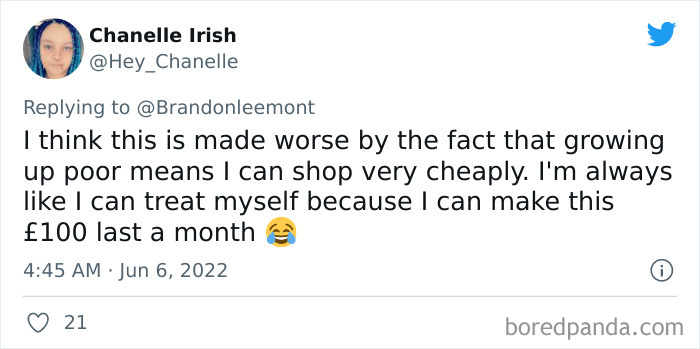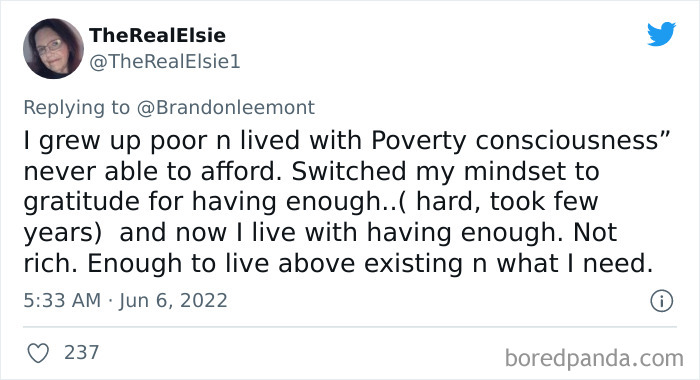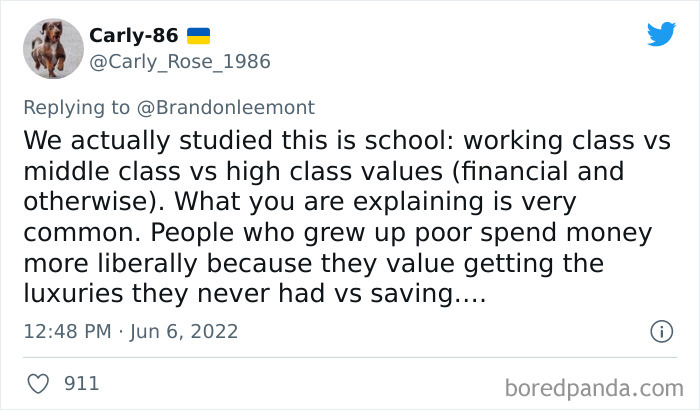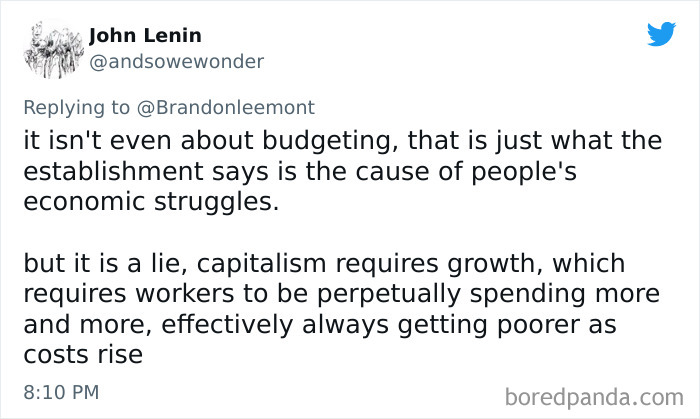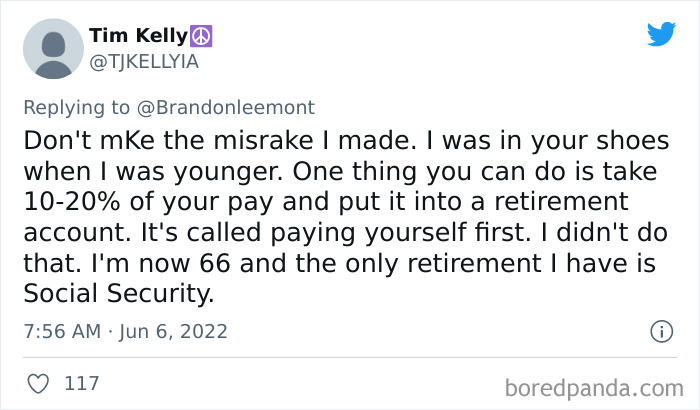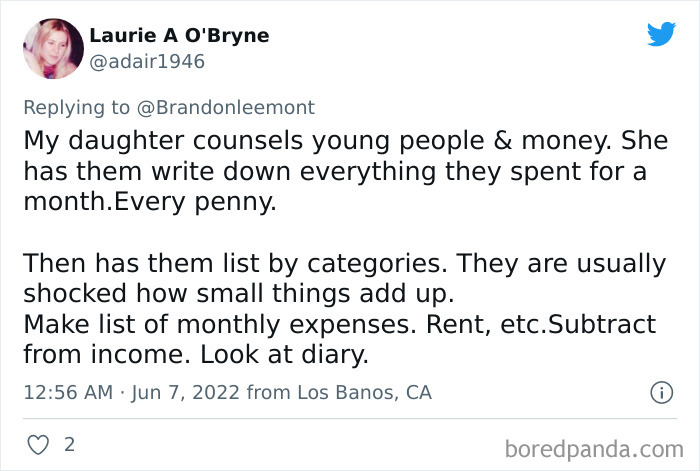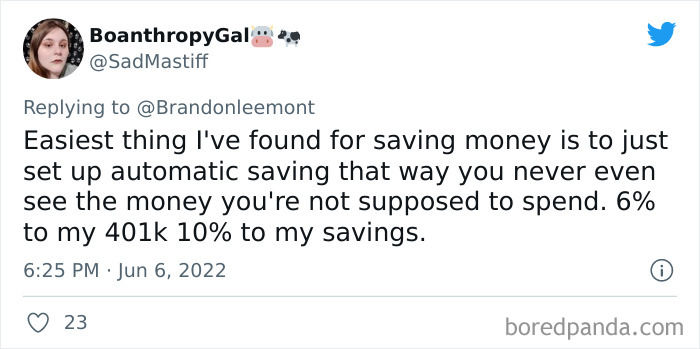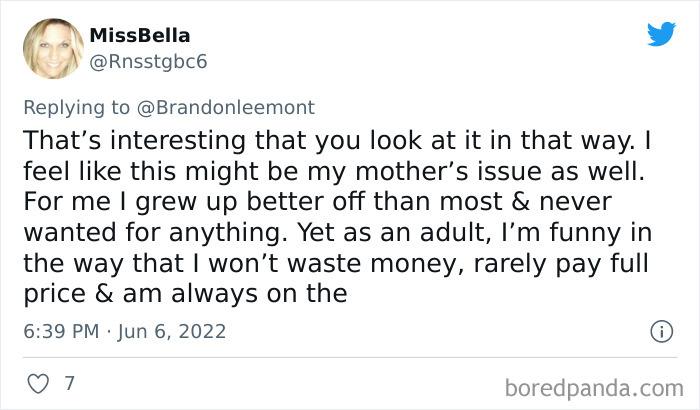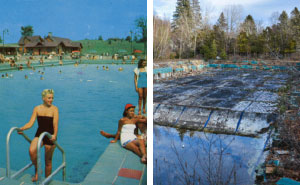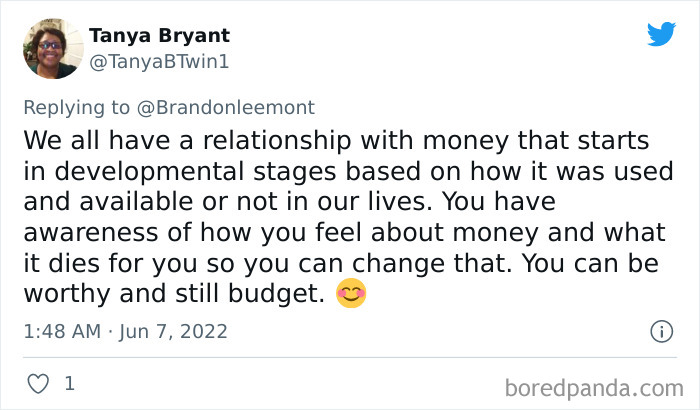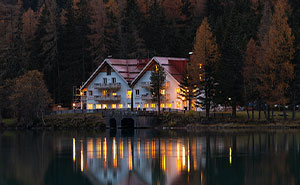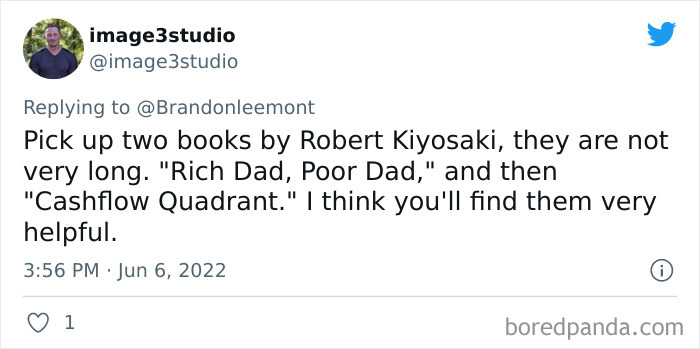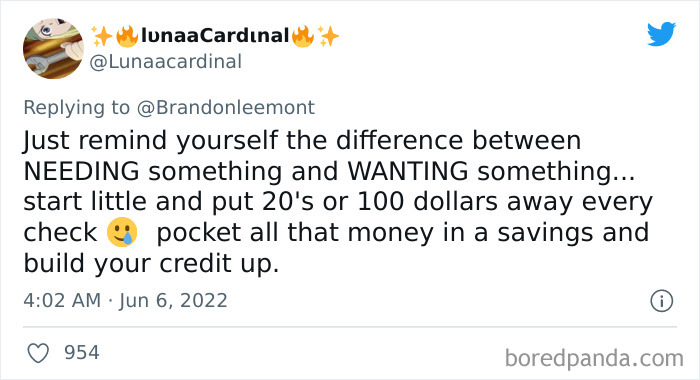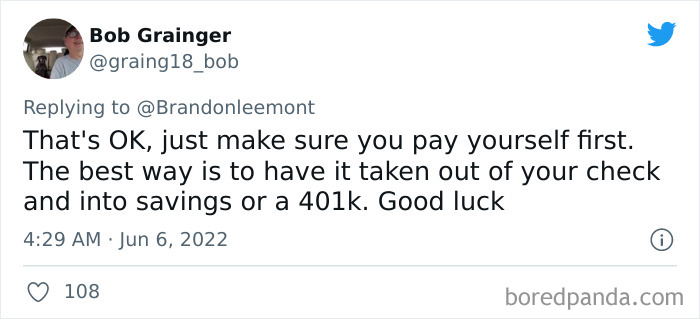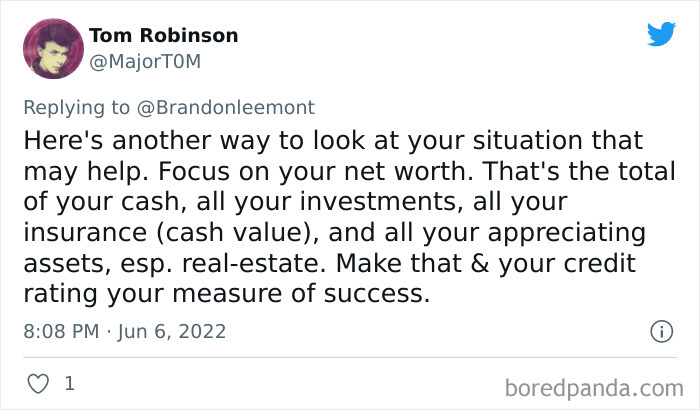In 2020, there were 37.2 million people living in poverty in the United States (approximately 3.3 million more than in 2019). That equates to 11.4% of the country's population.
Brandon L. from New Jersey knows perfectly well what that means. He too grew up poor. And it has affected the man so much that even now when Brandon is a responsible adult, his behaviors are still somewhat formed by his past.
"I think my biggest financial problem is I grew up poor," he tweeted. "So now that I make my own money, I don't know how to budget. I'm always gonna spend the extra penny for quality 'cause I can and I hate the feeling of being limited on what I can do [because] of a price tag."
And he's not the only one. After his honest confession went viral, people began relating to it by sharing some of their own personal struggles, ones that probably wouldn't be there if they just had more when they were little.
This post may include affiliate links.
Exactly. We were very poor growing up and I'm still poor now but maybe not as bad as it used to be. I can afford small comforts occasionally... But usually when I go shopping for anything not absolutely needed I will put items in my cart and by the time I get to the register I've put the items back because I talked myself out of it. I don't really NEED it, save that money for an emergency.
The struggles we see in these tweets have gained the attention of researchers as well. In fact, according to a large and growing body of scientific papers, poor kids grow up to have a host of physical problems as adults.
But that's not all. A sweeping recent study, conducted by following participants over a 15-year period, discovered that childhood poverty can also cause significant psychological damage in adulthood.
Impoverished children in the study had more antisocial conduct such as aggression and bullying, and increased feeling of helplessness, than kids from middle-income backgrounds, the study concluded. Poor kids also have more chronic physiological stress and more deficits in short-term spatial memory.
Being truly hungry is a kind of pain that is indescribable to people who have never experienced it, and when you know what it feels like you never want to experience it again. You don't just eat when you're hungry - you eat because you know you will be hungry later, and the little voice tells you there might not be food later.
From just window shopping, buying the basics, putting rest of money away til next pay day because you never know, now it’s just nice grabbing what I need with out just having to do that, but hardships teaches you
"What this means is, if you're born poor, you're on a trajectory to have more of these kinds of psychological problems," said Gary Evans, the author of the study and professor of environmental and developmental psychology at Cornell University.
"With poverty, you're exposed to lots of stress. Everybody has stress, but low-income families, low-income children, have a lot more of it," Evans explained. "And the parents are also under a lot of stress. So for kids, there is a cumulative risk exposure."
This is so true! Once I got my first "good" job, I got myself in financial trouble because I could finally have the things I wanted. The problem was, I wanted too many things. I have matured a lot since then and am responsible with money now, but for a few years, I wrecked my credit rating and really messed up my life.
I agree that money comes & money goes AND that ppl/relationships are what make life worth living but it's hard to have ppl in your life & successful relationships without having money. Even a little money makes a HUGE difference... Going out to eat? Sure, I'll come along, want to catch a movie? Absolutely! That stuff can't happen without money.
Evans, a child psychologist who specializes in the effects of stress on children, thinks these findings are important because kids who grow up in poverty are likely to stay impoverished as adults—did you know that there's a 40 percent chance that a son's income will be the same as his father's income?
"People walk around with this idea in their head that if you work hard, play by the rules, you can get ahead," Evans said. "And that's just a myth. It's just not true."
This is me but I can’t figure out what’s the higher quality! It’s a new world for me so I can’t tell whose actually high qualify and their products will last forever, or whose using it as a marketing ploy. Cloths, furniture, linens, everything.
In his study, Evans tracked 341 participants over a 15-year period, and tested them at ages 9, 13, 17 and 24.
Evans tested the short-term spatial memory of the adult study participants by asking them to repeat increasingly complex sequences of lights and sounds by pressing four colored pads in the correct order — similar to the 'Simon' game. The adults who grew up in poverty had a diminished ability to recall the sequences, compared to those who did not. "This is an important result because the ability to retain information in short-term memory is fundamental to a host of basic cognitive skills, including language and achievement," the study said.
Even though the participants were assessed on this measure only when they were adults, this test had the strongest association with childhood poverty of the four measures.
The Sam Vimes theory of social inequality. A rich man has $200 to spend on a pair of boots that last 20 years and a poor man can only afford a $50 pair that lasts 9 months. After 20 years, the rich man spent $200 and the poor man spent over $1300.
This was written by a well paid doctor. A poor person doesn't have 10% discretionary income to put in a savings account. Poor people pay $375 to borrow $300 for 30 days so they can pay a dentist. They need that $300 because their last $1 went to groceries for the kid and they are still skipping meals to feed the kid.
Im starting to realize I would rather have less stuff now that I’m older. I don’t need all the c**p I have so why spend money on it? I try to spend money on little treats that get used up so I’m not acquiring heaps of random c**p I forget about after a few months that just sits there.
Helplessness was assessed by asking the participants to solve an impossible puzzle. Adults growing up in poverty gave up 8 percent quicker than those who weren't poor as kids. Previous research has shown chronic exposure to uncontrollable stressors (such as family turmoil and substandard housing) tends to induce helplessness.
I do this. I buy things I want but always on sale for next to nothing
Wonderful Mindset! I wish I'd done that. I grew up poor too, got made fun of for not having the popular clothes and such. So when I had my son I went overboard. Bought him everything. His first Christmas looked like Toy's 'R Us had exploded in the living room. (Yes, I'm that old). When he got older I worked two jobs sometimes to afford all the newest game systems and the games. 1,000's of dollars. And now that he's grown the memories he talks about are things we did together, not things I bought. To have had that mindset and lived simpler, put extra money into savings for the future and lived within my means. Spent more time at home and less time working for extra money, honestly trying to fill a hole in myself and what I missed out on. If only we could get the chance to do it all again!. Hopefully someone reading these will take it to heart and know that living a life with the things you need and being grateful is so much better than being stressed and feeling like it's not enough.
This is missing it's continuation: "Because they are used to not having much money, they want to take advantage when they do. They often have a “live in the here and now” philosophy because you never know what tomorrow will bring. They are also extremely generous because they want everyone to have a good time"
It’s always safe to assume whatever system paradigm youre in, it’s been created intentionally to f**k you over. Always even the idea of the American dream is a sales pitch. So do the opposite always - never follow Crowds and if you can don’t have children, the ultimate trap. If you have kids you will work until you die that is the set up; they will grow up damaged and will be fed to the system.
Mental health was measured with a well-validated, standardized index of mental health with statements including, "I argue a lot" and "I am too impatient." Adults who grew up in poverty were more likely to agree with those questions than those from a middle-income background.
Chronic physiological stress was tested by measuring the participants' blood pressure, stress hormones and body mass index. People who grew up in poverty had a higher level of chronic physical stress throughout childhood and into adulthood.
My ex didn’t believe in them and we were supposed to live off one salary for the last 20 years and save that for retirement. No one thought he’d want a divorce after I had been at home with the kids for many years (not contributing to Social Security), and his six figure job would be outsourced! So after 24 years of marriage, going through divorce, bankruptcy, foreclosure, and surviving my oldest son’s suicide, I too am totally relying on Social Security. It’s not the worst thing I’ve been through in my life.
Excellent! It's important to see how small amounts of money add up.
Minimum wage jobs don't have 401k plans and you can't put aside 10% when your monthly paycheck is less than rent.
Evans believes the study has two implications. First, early intervention to prevent these problems is more efficient and more likely to work. "If you don't intervene early, it's going to be really difficult and is going to cost a lot to intervene later," he said.
Second, increasing poor families' incomes is the most efficient way to reduce a child's exposure to poverty and also their risk of developing psychological problems.
Evans supports the creation of a safety net, similar to Social Security's supplemental income for the elderly and disabled. If a family is poor and has children, the federal government, he thinks, should provide them with supplementary income sufficient to participate in society.
We read these tweets and sometimes think there's little we can do. But things don't have to be the way they are.
"It's not true you can't do anything about poverty," Evans said. "It's just whether there's the political will, and are people willing to reframe the problem, instead of blaming the person who is poor and, even more preposterous, blaming their children." So let's keep the conversation going.
If poor people had real-estate to measure would they still be in that category? Im pretty sure poor people rent.
Note: this post originally had 90 images. It’s been shortened to the top 30 images based on user votes.
This looks like they just took all the comments from a question and put them on here. Several are actually not from the people who grew up poor but from others giving them advice. What a lazy article.
I wouldn't consider this gallery "... things rich kids would never understand" so much as "financial habits of formerly poor people".
Yeah, nothing here about government cheese wheels, or the fact that all Kool-aid flavors are "colors", my favoite flavor is "purple" by the way. Nothing about wearing your hand me downs from the neighbor becuase their THREE boys are older, not to mention the item started off as their older SISTERS...
Load More Replies...The title here is very misleading. While some of these people, by their own admission, grew up as poor children in poor families and have carried this trauma into adulthood, about a third were either never actually poor themselves, or else the only lesson they took from the experience was the need to squirrel away money now that they have it. And several of these posts are just the financially secure pontificating to the financially desperate on how their whole problem is of their own making, because they and their parents simply didn't know how to manage their entirely adequate incomes - completely ignoring the fact that no amount of financial acumen can make 'Insufficient Income' magically transform into 'Plenty'!
This looks like they just took all the comments from a question and put them on here. Several are actually not from the people who grew up poor but from others giving them advice. What a lazy article.
I wouldn't consider this gallery "... things rich kids would never understand" so much as "financial habits of formerly poor people".
Yeah, nothing here about government cheese wheels, or the fact that all Kool-aid flavors are "colors", my favoite flavor is "purple" by the way. Nothing about wearing your hand me downs from the neighbor becuase their THREE boys are older, not to mention the item started off as their older SISTERS...
Load More Replies...The title here is very misleading. While some of these people, by their own admission, grew up as poor children in poor families and have carried this trauma into adulthood, about a third were either never actually poor themselves, or else the only lesson they took from the experience was the need to squirrel away money now that they have it. And several of these posts are just the financially secure pontificating to the financially desperate on how their whole problem is of their own making, because they and their parents simply didn't know how to manage their entirely adequate incomes - completely ignoring the fact that no amount of financial acumen can make 'Insufficient Income' magically transform into 'Plenty'!
